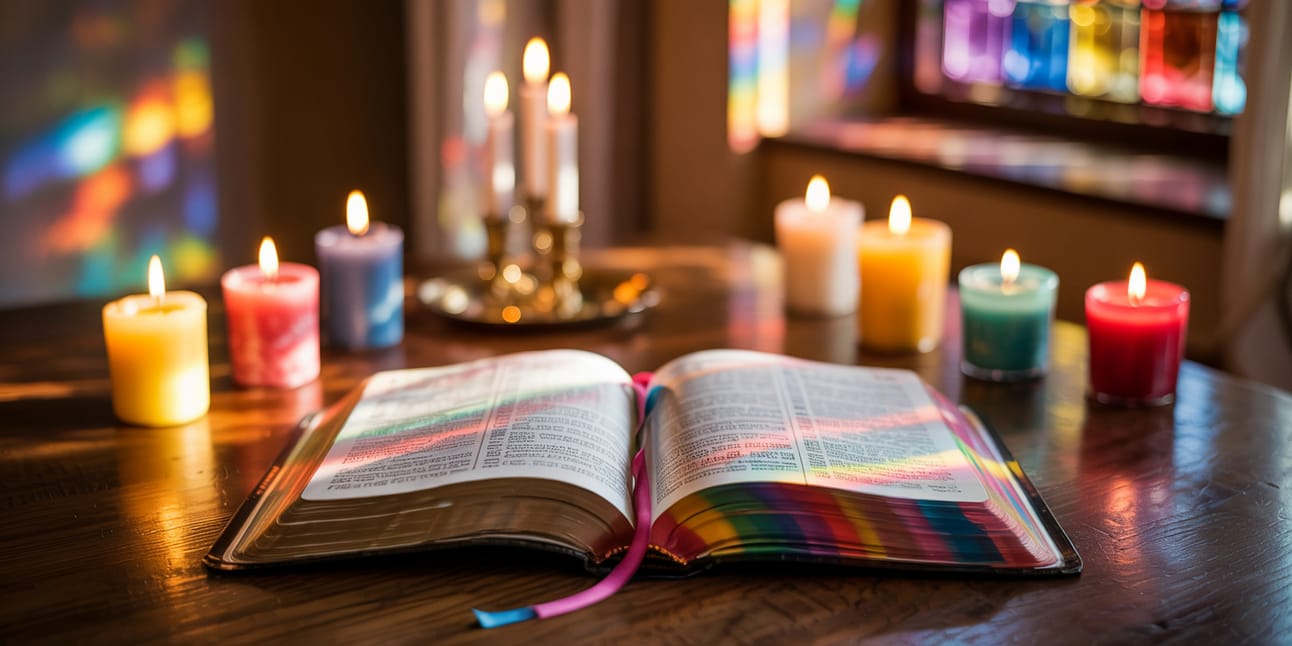
Now I know that’s gonna ruffle some feathers. Somebody out there’s already half a tweet deep about how I’m twisting the Bible to suit the “gay agenda,” which is funny, because most of us can barely get through the day without cis-straight folks twisting the Bible into a patriarchy participation trophy.
But let’s get one thing straight: the Bible isn't. Not the way folks think, anyway.
See, the Bible is not a divine group chat where Love dropped exact quotes for us to tattoo on our lower backs and slap on decorative sign for the home that we buy at Hobby Lobby. It’s more like a sacred scrapbook – a collection of stories, poems, dreams, and desperate prayers that are written by people who were just trying to survive empire, stay human, and make sense of the sacred in a world that kept trying to stomp it out. (Please note, I didn't say “written by God,” because it wasn't).
Bart Ehrman would tell you straight up: these texts didn’t come from on high, all bound in leather and whispering KJV English. They came from people. Messy, oppressed, hopeful people. And that alone oughta tell you something about the heart of the Bible: it’s always been written from the margins.
And if you’ve spent more than five minutes in church, you know queer folks have always lived there.
Let’s start with that Ethiopian eunuch in Acts 8. A gender-nonconforming, ritually excluded, Black foreigner. According to the rules, they had no business anywhere near the early Jesus movement. And yet – bam – Philip drops in like an angelic Uber driver and the eunuch is baptized before the end of the chapter. No purity test. No theology quiz. No “pray the gay away” pamphlet. Just “You want in? You’re in.” That’s not just inclusion – that’s a heavenly mic drop.
And don’t tell me David and Jonathan were just “really good friends.” That’s like saying “Brokeback Mountain” was about camping. David said Jonathan’s love was “greater than the love of women,” and in case you missed it, he wrote that in a public lament. In front of the whole kingdom. This was no behind the scenes bromance. This was poetry, heartbreak, and a little bit of glitter if you ask me.
Of course, we do need to be careful with projecting modern labels onto ancient texts. But let’s also be real: erasing queer possibility because it makes us uncomfortable? That's not scholarship. That’s cowardice in a clerical collar.
Ruth and Naomi? They didn’t just ride out a famine together. Ruth literally pledges herself to Naomi in the kind of covenantal language you usually hear at weddings. “Where you go, I will go.” I'm hear to tell you, that's not Hallmark. That’s ride-or-die. That’s chosen family. That’s “we may not fit your mold, but we are a reflection of the divine anyway.”
And Jesus? Jesus broke every rule about gender performance, family structure, and social norms. He affirmed eunuchs. He formed chosen family. He hung out with sex workers and lepers and people who had been religiously canceled.
That is not straight, buttoned-up Christianity. That is queer liberation theology in sandals.
Bishop Spong saw it before most of us were even allowed to say “gay” in church. He said we’ve got to read the Bible with our eyes opened to the prejudice baked into the pages by time, culture, and power. You want a biblical worldview? Great. But be ready for it to include people your grandma's pastor told you to fear.
Because here’s the real kicker: the anti-queer stuff? That’s the new invention. That’s the algorithm-friendly version of Christianity, polished up for white suburban comfort. The early church didn’t have time for gender policing – they were too busy building a countercultural movement where everyone brought what they had and no one went without.
Truth is, queerness has always been part of the story. It’s woven through the margins, humming in the songs of outcasts, sparkling in the quiet defiance of people who knew they weren’t what the world expected, but showed up anyway. The Bible is full of holy misfits. It is not a handbook for heteronormativity, it’s a love letter to the weird, the wounded, and the wildly free.
So yeah. The Bible is pro-queer.
Not in some soft-focus, “love the sinner” kind of way, but in a bold, boots-on-the-ground, flip-the-tables kind of way. It doesn’t whisper tolerance—it shouts belonging. From the margins to the mountaintop, it tells the story of a Love that refuses to conform, refuses to exclude, and refuses to let empire have the last word.
If you're reading the Bible and it’s not making room for trans kids, drag queens, nonbinary saints, and the fabulous survivors of every kind of exclusion the world can dish out… you need to read it again. Because the biblical Love? It’s not neat, it’s not narrow, and it sure as hell ain’t only straight.
So, go back and read your way thought it again (or for the actual first time?). This time, read it from the underside. Read it from the closet. Read it from the kitchen table where a mama prays her kid makes it through another day at school. Read it like it was meant to be read: as liberation for the least, the lost, and the left out.
